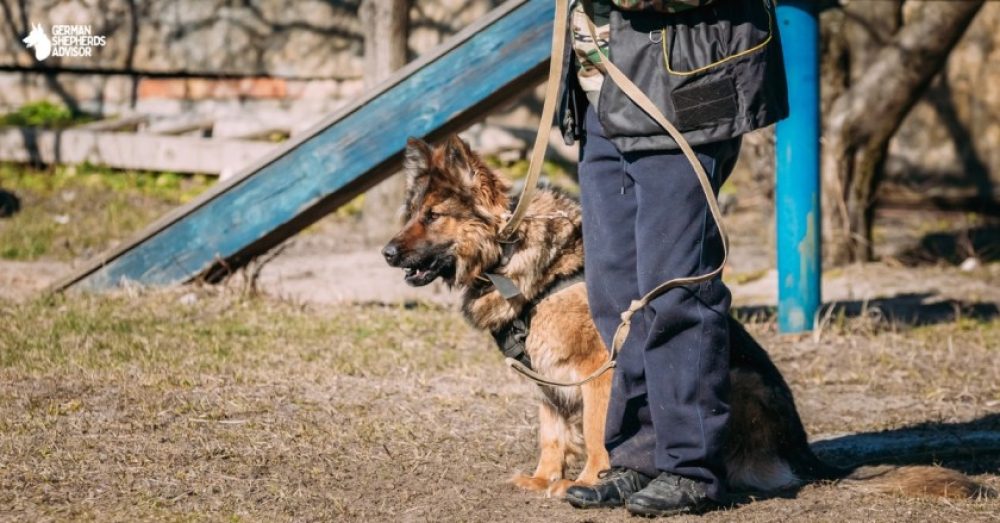Most people are aware of the fact that German shepherds are popular dogs. They’re intelligent, trainable, and easy to groom and maintain. They’re also protective and will fight fiercely for what they believe is theirs: their owners and family members. German shepherds were originally bred as guard dogs, so it’s no surprise that they have a dominant nature to protect those under their care. Here we’ll look at why these traits exist in the breed, as well as how you can control this natural instinct so your dog doesn’t become overprotective.
One thing about german shepherds is that there aren’t many health problems associated with them. Their coats need attention every few months if you want to keep them healthy and they need a proper, nutritious diet.
Background
All dogs are intelligent creatures and german shepherds are no exception. They’re easily trainable and eager to please their owners which makes them great companions for the right owner. They also make good watchdogs because of their protective nature; this is one reason why you should take extra care when walking your pup around the neighborhood! People don’t like strange dogs coming into their yard without permission and if your dog barks at strangers it will only cause problems. German shepherds bark very loudly, so be prepared for that problem too. There’s nothing wrong with an obedient dog who protects its owner, but there comes a point when such behavior can become dangerous. If you suspect your dog is developing an overprotective nature, its time to nip it in the bud before your pup does something you’ll regret.
If your German shepherd growls or barks at strangers, it’s usually a sign that he or she feels protective. It’s important to remember that this behavior is normal for the breed and there are several things you can do to calm them down when they feel threatened.
As with any puppy, giving your german shepherd lots of attention when he or she behaves well will help teach them what behaviors are welcome. You can also give them their own safe space where no one will bother them without their consent. A crate would be ideal for this because it gives them a place they can retreat to that is still part of their home. If your dog starts acting aggressively towards strangers, it’s time to give them another place to go – like a room or even outside if you have a fenced-in yard.
German shepherds are very protective of their family members and territory. They were bred for this purpose so it’s not surprising that they act this way. With proper training, however, german shepherds can learn which behaviors are acceptable and which aren’t. Never punish your pup for protecting its territory; simply show them what you want them to do instead and reward good behavior with attention. Don’t let people enter your home uninvited or take things that don’t belong to them without your dog’s permission. This will help instill a sense of calmness and control in your pup instead of the urge to protect what it believes is theirs.
Remember that any dog can become overprotective if you encourage them early on, so try your best to train your pup from a young age with as much positive reinforcement as possible. Don’t react aggressively towards strangers or allow anyone to touch your dog without its consent; this can cause all sorts of problems later down the road when they start viewing everyone as a threat. With patience and care, you can have a loving pet who isn’t overly protective or aggressive – just remember to give them enough attention and their own safe space for when they feel threatened!
How protective are german shepherds?
The German shepherd is a large dog breed originally from Germany. The K9 family includes members such as the Alsatian, Dutch Shepherd, Belgian Malinois and the Giant Schnauzers. They are extremely intelligent and loyal to their owners and families, making them excellent guard dogs for many different settings including homes and businesses. Characterized by high energy levels and intelligence, these dogs will protect you fiercely but how protective they actually are is open to debate.
Reports of how protective german shepherds can be vary widely depending on how they were raised and who they were raised with. In many cases, it seems that how protective a German shepherd is in your home or neighborhood may depend on how secure your residence is – not how “protective” the dog is.
Protective nature
There are many reports of how protective German Shepherds can be and how dangerous they may become when they feel threatened at home or in the neighborhood. Many German Shepherds that grow up with children, for example, will defend them fiercely if need be. Though it’s not recommended to use small children as a test subject, there are many reports of how these dogs deal with bullies and other neighborhood threats without hurting the child. Even though your trusted pet may try to step in on behalf of the child if it feels threatened, you should always teach your children how to properly interact with animals so that everyone stays safe.

One interesting report describes how four German shepherds who were left all day began howling in anguish when the owner used to leave every morning. They howled, barked and howled until he came back home. The dogs would later howl again as he left – even though it was the same routine. To this day there’s no conclusion if these howls were howling for attention or if they were trying to warn their owner of danger; all four dogs died by gastric bloat due to eating their own food too fast after their owner disappeared.
Following a strict training program is important for many dog breeds but especially German shepherds because of the level of protective instinct that these dogs are known for having. If you can take your pet out with you to teach them how to act around strangers, other animals and loud noises then you will be able to feel safe knowing how they might react in tough situations. This training is important because how dogs act around their owners or other “family members” compared how they act when you are not around is something that may surprise you. It’s also important if you have children with your pet, as how these dogs respond to smaller kids can vary widely depending on how many dogs are defending them and how close the child is trying to get with the animal.
One case where it seems that German Shepherds are often misjudged was in 2013 when a mother left her two-year-old inside an enclosed car for just three minutes with the family dogs – who were described as German Shepherds according to neighbors. A neighbor noticed smoke coming from the car and how agitated the dogs were trying to get at the windows so they broke through it to try rescuing the child. They were also howling, scratching at windows, and howled for several minutes before police arrived.
Finally, while some people may debate how “protective” German shepherds are for your home or neighborhood, their abilities as loyal companions cannot be matched by any breed of dog. Not only will these animals work hard to keep you safe but they are willing to do anything that you ask of them without question, making them great additions to many families around the world. If you’re considering getting a protective dog for your family then remember how important it is how both you and your pet can trust each other – not how much bark they may have.
Important aspects to consider if you want to how protective german shepherds are for your home or neighborhood might be how the dog was raised and how it interacts with not only family members but outside interactions as well. For example, how the dog would react around strangers, other animals and loud noises could depend on how often it has been exposed to these situations. If you want a pet that will work hard to keep you safe then remember how loyal German shepherds can be – even willing to do whatever is asked of them without questioning their owners. However, how dogs act around children (and vice versa) can vary widely depending on how many dogs are defending.
What age does a German shepherd become protective?
When do German shepherds become protective? It’s a common question among many dog owners, especially those with children or who have other pets. If you have an older shepherd that is being protective toward you, there are ways to help them let go of their guard so they can become loving companions again.

After 10 months, they might still be friendly and nice around family members, but not strangers.
After one year of age, a German shepherd becomes protective. This is considered the puppy stage – the time in your dog’s life when he wants to explore and test his limits. When this happens with a GSD, it can become a problem because you have to give them boundaries for what is acceptable behavior and what isn’t allowed. If you treat this as a phase that will pass eventually, things should improve within a few weeks or so. The best thing you can do while your dog is going through this period of testing their limits is provide supervision at all times while children are around them. It may seem like common sense advice, but you really have to do this in order for your GSD to view them as part of his family.
German shepherds become protective when they get older and their personality begins to show itself. This is a normal part of becoming an adult but may lead to some problems for you and your pet if he does not have a high level of obedience training. The best way to deal with it is by reinforcing the dominance that you have over him through positive reinforcement while he obeys commands from you that will help him be more relaxed at home. If you need assistance, contact a trainer who has experience working with German shepherds can help.
This study tested female German Shepherds’ reactions towards strangers who walked toward her owner in different ways: one where the stranger did nothing, one where the stranger reached out a hand, and another where the stranger would make a lot of noise or run at the owner while flailing his arms. The test consisted of having 3 strangers do each action while the German Shepherd owner was sitting on a chair with their dog standing beside them. The owner’s task was simply to sit there and not respond. Then, another stranger would walk in from behind the seated owner and try to get past the dog to steal an object from a bag on the floor behind them. In order for this stranger to succeed, they needed to pass by or touch either person (owner or dog).
The results? Out of 150 trials conducted, only 12 times did the female Shepherd’s protectiveness lead it to bodily block one of these individuals who had approached in an aggressive manner toward its master. That means that only 8% of the time was this protective instinct exhibited! Surprisingly, when any stranger walked towards them (whether or not they looked aggressive), these female Shepherds lunged toward them a whopping 88% of the time! So, if a stranger were to approach you and your German Shepherd, it is probably more likely that your pet will try to bite them rather than protect you.
Because this study only tested female German Shepherds, which makes up about 65% of the total dog population, we won’t know for sure how protective male GSDs are until another similar experiment is conducted. But from these findings, one can assume that most dogs aren’t going to start barking and growling at every person who gets too close. In fact, most individuals don’t even notice when their own dog displays a behavior as subtle as a stiffened posture or a low growl. On the other hand, these behaviors may be misconstrued by others and taken as aggressive and dangerous when in reality they are simply signs of discomfort and uncertainty. Also, it’s important to keep in mind that 1 out of 150 is not bad for an 8% success rate!
FAQS
Are female German Shepherds protective?
Every dog owner wants to know what their pet is thinking. One way of figuring out is to simply ask them, but most people are not fluent in Dog. If only there was a way to see how the dog feels about certain situations by looking into its eyes. Luckily for us, Dr. Stanley Coren may have found that alternative with his latest study on German Shepherds and protection.
What age does a German shepherd become protective?
A German Shepherd puppy becomes protective when they reach about 8-10 months old. They need to be socialized with people and dogs during this time in order for them not to act aggressively later on in life. Puppies should not be allowed to act aggressively until after 10 months, because it could mean the difference between training your GSD as a friendly companion or one that will attack others who come near their family members.

